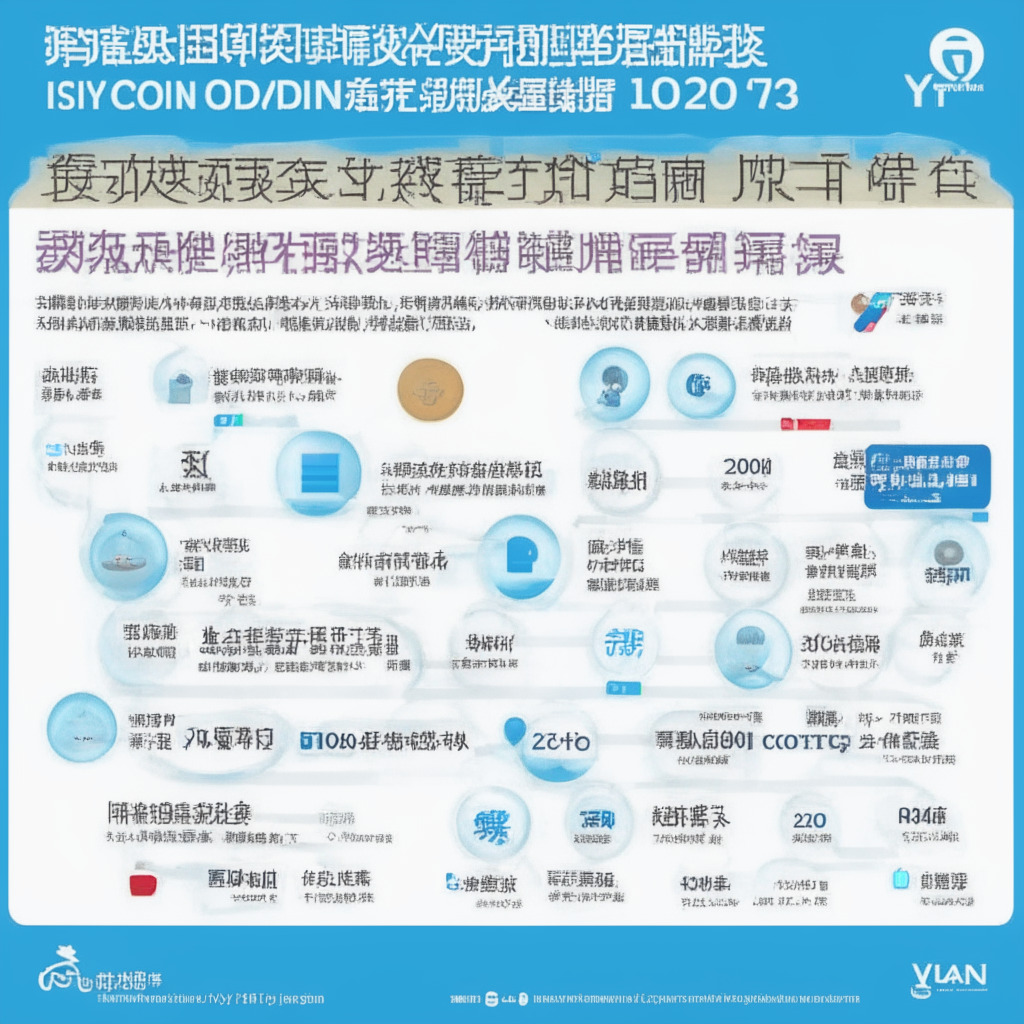“Tencent, the operator of WeChat and WeChat Pay, is teaming up with the People’s Bank of China to promote the use of the digital yuan via Project mBridge. While this challenges the dominance of WeChat Pay and Alipay, the digital yuan is anticipated to complement rather than compete with these platforms. This venture signifies a technological revolution in payment systems, though its uncertainties remain to be explored.”
Search Results for: PBOC
China’s Crypto Future at Risk: The Impact of Pan Gongsheng’s Potential PBoC Governor Role
The appointment of well-known crypto-sceptic, Pan Gongsheng, within the People’s Bank of China, is triggering fresh concern for cryptocurrency prospects in the nation. His possible promotion hinders hopes of China softening towards digital currencies and may pose a significant barrier in global crypto integration.
China’s Digital Yuan Giveaway: A Decisive Path to Widespread Crypto Adoption or A Hype Fizzle?
China’s People’s Bank is extensively promoting digital yuan adoption through giveaways, partnerships with e-commerce giants and targetting cross-border trade, tourism, and domestic businesses. English options for digital yuan app aim to entice overseas users, pointing towards the push for global digital currency adoption.
Harnessing Digital Yuan and Hong Kong’s FPS: A Leap Towards International Financial Synchronization or Concern for Economic Autonomy?
The digital currency research division of People’s Bank of China (PBoC) has interlinked its CBDC platform with Hong Kong’s Fast Payment System (FPS), to expedite cross-border digital yuan transactions and enhance system compatibility with international payment networks. However, this convergence of global currency networks may risk homogenizing diverse economic systems.
How the Digital Yuan is Revolutionizing Gold Recycling and Real Estate Transactions in China
“China’s financial entities, local governmental bodies and businesses are gradually embracing the digital yuan, China’s Central Bank Digital Currency (CBDC), revolutionizing sectors from gold recycling to land registry fee payment. The gold recycling project powered by digital yuan and CBDC-powered land registry adoption in Fuqing highlights the acceleration of the digital yuan in various scenarios.”
Leveraging E-CNY and Smart Contracts: China’s Strides in FinTech Innovation versus Security Challenges
“The Chinese financial sector is embracing smart contracts powered by its digital yuan, e-CNY, in a bid to revolutionize businesses. It hopes to incorporate advancements like digital RMB prepayments and smart contract tech from Bitcoin, crypto, and blockchain fields. But centralization may raise trust and security issues.”
Riding the Bull and Bear Market: Crypto Rebounds Amid Regulatory Challenges
“The digital era brought advancements including the surging value of Bitcoin and other altcoins. Despite potential leverage liquidations for altcoins like Solana’s SOL, coins like Bitcoin Cash, Maker DAO’s MKR, and Ether are on the rise. Important influences on the market include regulatory oversight, legal challenges, and increasing participation from traditional financial institutions.”
China’s e-CNY: Future of Cross-Border Transactions or Risk for Financial Stability?
“China’s digital currency, the e-CNY, might soon see significant cross-border usage as part of global infrastructure development strategy, the Belt-Road-Initiative. The purpose is to streamline and boost China’s international trade initiatives. However, shifting this primarily domestic project towards cross-border trade is causing concern.”
Digital Yuan: China’s Leap Into Blockchain Salary Payments and Its Global Implications
A growing number of Chinese companies are switching to digital yuan for salary payments. The Zhongkai High-tech Industrial Development Zone, in partnership with the ICBC, has become the first city company to pay its employees, including CCP officials, in digital yuan. This initiative encourages digital yuan adoption and broadens its application in the public sector, helping to tackle the longstanding US dollar dominance.
Digital Yuan Revolutionizing Retail Payments: A Leap Towards Cashless China or an Unrealistic Dream?
Mu Changchun, the head of a Chinese Central Bank, asserts that the digital yuan could revolutionize retail payments nationwide, potentially outshining cash. He urges banking and e-pay allies to optimize QR Code protocols and encourages merchants to embrace e-CNY as a viable payment mode.
Digital Yuan Reinventing Retail: A Fascinating Future or a Risky Undertaking?
“Changchun Mu, from the Digital Currency Research Institute at PBOC, advocates for wider digital yuan use in retail. He envisions wallet providers adhering to financial licensing standards and a standardized QR code system for efficient transactions. Trials for e-CNY have expanded to 26 locations across 17 cities.”
China’s Giant Leap: JD.com’s Digital Yuan Revolution for Supply Chain Financing
“JD.com and ICBC are developing a digital yuan using smart contract technology for supply chain financing, enhancing verification, risk identification, and credit guarantees for SMEs. The solution, fostering trust among financial institutions, aims for wider digital yuan acceptance and marks a significant moment in streamlining financial processes.”
Digital Yuan: An Impetus for Cross-Border Payments or Just a Fleeting High?
“The Chinese digital yuan, or e-CNY, is being recognized as a major driver in the surge of cross-border payments between mainland China, Hong Kong, and Macau. Despite Hong Kong and Macau’s separate economies and currencies, initiatives from the People’s Bank of China have enabled cross-border e-CNY transactions. Questions still remain about potential regulatory hurdles and the long-term impact of these initiatives.”
Harnessing the Power of Digital Yuan: China’s Big Blockchain Push and Its Consequences
Shanghai and Suzhou cities aim to accelerate the adoption of China’s Central Bank Digital Currency, Digital Yuan. The move follows the People’s Bank of China’s revelation that $250 billion worth of Digital Yuan transactions have been processed nationwide. Despite the significant figure, it represents a minor part of the Chinese economy, motivating these bustling cities to advance digital currency promotion.
Leveraging China’s Digital Yuan for Green Financing: Pros, Cons, and Future Potentials
Zhongshan Jewelly Optoelectronics Technology, a Guangdong-based firm, has secured over $276,000 from China’s first digital yuan-powered green finance loan. Using the digital yuan offers cost-effective, efficiency for enterprises, with real-time fund transfer and no incurring handling and service fees. Meanwhile, its traceability can prevent misappropriation of green funding loans.
Digital Yuan Adoption: Genuine Demand or Orchestrated Push? Unraveling the Intricacies
China’s digital yuan adoption is surging, with tax payments through the currency totaling $51.3 million from January to June 2023. However, most transactions occur through a CBDC tax payment platform operated by Postal Savings Bank’s Hunan Branch, raising questions about true adoption rates.
Exploring China’s Crypto Leap: Minsheng Bank’s Digital Yuan Initiative with JD.com and the Risks Involved
China’s Minsheng Bank, in alliance with e-commerce giant JD.com, is launching a digital yuan-based payment service. This enables Minsheng customers in the CBDC pilot zone to use digital yuan tokens for platform purchases. Minsheng differentiates as the first Chinese firm predominantly owned by private sector interests to support the nation’s digital yuan pilot.
Asian Games Shaping Digital Yuan Expansion: Opportunities, Challenges and City Rivalries
The city of Shaoxing is set to roll out an Asian Games-themed digital yuan giveaway to demonstrate China’s progress in central bank digital currency (CBDC). Supermarkets, hospitals, and transport providers in the city are embracing digital yuan payment functions, highlighting the adaptability and acceptance of this payment method. Additionally, the central People’s Bank of China is trying to make the digital yuan integral to metro payments.
Exploring China’s Deepening Embrace of the Digital Yuan: Opportunities and Concerns
“Several Chinese banks are considering incorporating the digital yuan, or e-CNY, into their services. Industrial Bank has introduced a CBDC-powered service for bulk commodity spot clearing. More banks are joining People’s Bank of China’s pilot programme, signalling a significant shift in China’s financial landscape.”
Prospects and Hurdles: An Analysis of China’s Digital Yuan Adoption and Its Global Impact
China’s central bank, the People’s Bank of China (PBoC), executed $250 billion in transactions using the Central Bank Digital Currency (CBDC), named digital yuan, over an 18-month period. Remarkably, a mere 0.16% of China’s currency supply is in digital yuan. Despite a substantial transaction milestone, the currency’s utilization rate within China’s vast economy remains relatively limited.
Sailing or Sinking: The Adoption of Digital Yuan in China’s Aviation and Beyond
Chinese businesses will soon experience a digital yuan era in aviation, following a cooperation between China Merchants Bank and the Civil Aviation Administration. This e-CNY platform aims to simplify transactions, hinting at the future of digital economy. Despite rapid growth, the crypto adoption is shadowed by risk of fraud and deception, underlining the complexity of digital currency implementation.
Digital Yuan’s Expedited Rise: Innovative Financial Revolution or Privacy Catastrophe?
The Chinese city of Shenzhen has reported the creation of nearly 36 million digital yuan wallets, accelerating the integration of blockchain-based central bank digital currencies (CBDCs) into everyday commerce. This expansion raises questions about regulation, privacy, and data protection in this growing currency system. Despite potential concerns, the adoption of CBDCs, supported by initiatives like the People’s Bank of China’s SIM-card based CBDC wallet, continues to progress.
Cross-Border Potency of Digital Rubles and Yuan: Boon or Bane for International Trade?
The dialogue between Russia and China’s central banks is accelerating speculation around Central Bank Digital Currencies (CBDCs). While Russia aims for early initiation with domestic commercial banks, China is progressing with offline and CBDC wallet tests. Meanwhile, Russia’s new legislation permits “non-residents” to own digital ruble wallets, establishing the digital ruble as an international trading tool. These developments challenge traditional banking norms and raise questions concerning international trade norms, regulations, and digital security.
The Crypto Rollercoaster: A Week of Breakthroughs, Setbacks and Controversy
“Bitcoin continues to attract institutional investors, while Ethereum users propose ERC 7265 to counter DeFi hacks. Solana’s liquid staking protocols see a 91% surge, hinting at mainstream market’s growing crypto acceptance. Yet, regulatory tensions, security concerns, and the rise of crypto-related cybercrimes pose significant challenges in the crypto landscape.”
China’s Rate Cut Impact on Bitcoin: Boost or Bust for the Crypto Market?
Bitcoin struggles to find an upward trajectory amid China’s first benchmark lending rate cut in 10 months, reflecting a slowing economy. Market participants question the rate cuts’ sufficiency to revive China’s economy, while crypto enthusiasts anticipate a larger stimulus package may bring benefits to bitcoin.
Digital Yuan Transforming Public Transport: Pros, Cons, and Future Challenges
The Chinese city of Qingdao is piloting a digital yuan payment solution for public transport using NFC technology, enabling payments via mobile devices even without power or network coverage. Meanwhile, Ningbo plans to distribute $140,000 worth of CBDC discount tokens in digital envelopes. These developments mark significant progress in central bank digital currency adoption.
Digital Yuan Adoption Surge: Protecting Citizens from Emerging Scams and Fraudsters
Chinese police report an increase in digital yuan-themed scams amidst the CBDC adoption drive. Fraudsters create authentic-looking apps using digital yuan logos to dupe citizens into transferring their money to illegitimate accounts. Authorities emphasize cybersecurity measures and public awareness campaigns to mitigate these risks while urging individuals to remain vigilant and understand potential risks associated with new technologies.
Uniswap Scam Exposes Sophisticated Deception: How to Stay Safe in Crypto
The crypto community experienced a sophisticated scam involving a fraudulent Uniswap website, complete with a fake Zoom recording featuring imposters posing as Uniswap executives. The incident highlights the importance of vigilance and thorough research in the ever-changing world of blockchain and cryptocurrency.
Digital Yuan Integration in Asian Games: Progress or Global Power Play?
The digital yuan is becoming a predominant form of payment in China, with venue cities for the Asian Games incorporating central bank digital currency (CBDC) transport solutions. The updated digital yuan app’s “ride code” function lets users scan their devices on the Hangzhou Metro, allowing for fast and efficient public transportation payments.
Yuan Depreciation vs Dollar Strength: Impact on Bitcoin and Global Crypto Markets
China’s yuan (CNY) experienced a 2.7% depreciation against the U.S. dollar (USD) this month, historically considered bullish for alternative assets like bitcoin and gold. However, the strengthening U.S. dollar could lead to continued monetary tightening worldwide, posing a headwind for risk assets, including cryptocurrencies.
Digital Yuan Loans for Tech Startups: Transforming Finance or Risking Instability?
The Hunan Province in China has introduced digital yuan loans for tech startups, as the country explores central bank digital currency (CBDC) financing options. With real-time online lending, digital yuan can save time and handling fees, promoting small businesses and showcasing CBDC potential in lending. However, potential risks, such as market volatility and cybersecurity, must be addressed diligently.
BNP Paribas Connects Digital Yuan Wallets: Integration Breakthrough or Power Shift Concern?
BNP Paribas connects digital yuan wallets to bank accounts, enabling corporate clients to access e-CNY via the Bank of China’s system. This could facilitate seamless transactions but raises concerns over China’s financial power and privacy issues.































